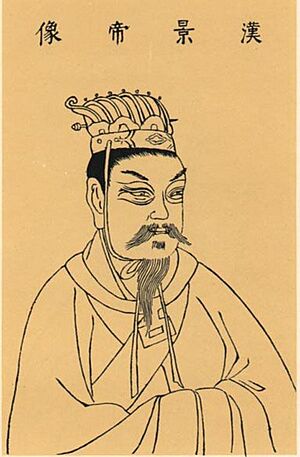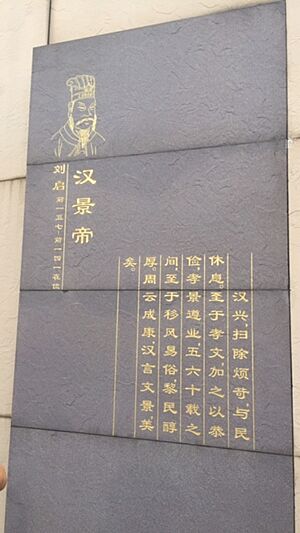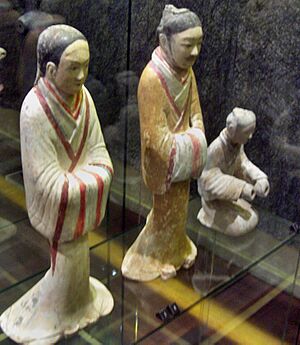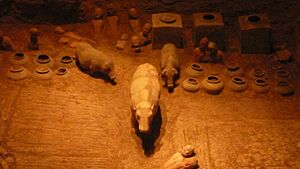Emperor Jing of Han facts for kids
Quick facts for kids Emperor Jing of Han |
|||||||||
|---|---|---|---|---|---|---|---|---|---|

A picture of Emperor Jing from Sancai Tuhui
|
|||||||||
| Emperor of the Han dynasty | |||||||||
| Reign | 14 July 157 – 9 March 141 BC | ||||||||
| Predecessor | Emperor Wen | ||||||||
| Successor | Emperor Wu | ||||||||
| Born | Liu Qi (劉啟) 188 BC Jinyang |
||||||||
| Died | 10 March 141 BC (aged 47) Chang'an |
||||||||
| Burial | Yang Mausoleum | ||||||||
| Consorts |
|
||||||||
| Issue |
|
||||||||
|
|||||||||
| House | Liu | ||||||||
| Dynasty | Han (Western Han) | ||||||||
| Father | Emperor Wen of Han | ||||||||
| Mother | Empress Xiaowen | ||||||||
Emperor Jing of Han (born Liu Qi, 188 BC – 9 March 141 BC) was the sixth emperor of the Han dynasty. He ruled from 157 BC to 141 BC. During his time as emperor, he worked to reduce the power of the local kings and princes. This led to a big fight called the Rebellion of the Seven States in 154 BC. Emperor Jing successfully stopped this rebellion. After that, princes could no longer choose their own government officials. This helped make the central government stronger. His actions prepared the way for the long and successful rule of his son, Emperor Wu of Han.
Emperor Jing continued many good policies from his father, Emperor Wen. He tried not to interfere too much with people's lives. He also lowered taxes and promoted saving money in the government. He made criminal punishments less harsh, just like his father. His mother, Empress Dou, followed Taoist ideas, which influenced his gentle way of ruling. Emperor Jing was the last Han emperor who was a common ancestor to all later emperors. All emperors after him in the Western Han dynasty were descendants of his son, Emperor Wu. All emperors of the Eastern Han dynasty were descendants of his sixth son, Liu Fa.
Contents
Early Life and Becoming Crown Prince
Emperor Jing, whose birth name was Liu Qi, was born in 188 BC. His father was Emperor Wen, who was then the Prince of Dai. His mother was Consort Dou, one of his father's favorite wives. Liu Qi was his father's oldest son.
In 180 BC, his father became emperor. Liu Qi was then made the crown prince in 179 BC. A few months later, his mother became the empress. As a child, Prince Qi was known for being kind. His mother, Empress Dou, was a strong believer in Taoism. She made sure all her children and grandchildren studied Taoist teachings. He was also very close to his older sister, Princess Liu Piao, and his younger brother, Liu Wu. Both were also children of Empress Dou.
As Prince Qi grew up, he started his own household. A smart and efficient advisor named Chao Cuo became a trusted friend. Some people thought Prince Qi enjoyed life too much. His father, Emperor Wen, even thought about replacing him as crown prince with his brother Liu Wu. But many officials disagreed, so Emperor Wen did not do it. In 157 BC, Emperor Wen passed away. Prince Qi then became the new emperor.
First Years as Emperor
When Liu Qi became emperor, many officials were surprised. They thought he might be a bad ruler, but he proved them wrong. Emperor Jing was a very capable leader. He was greatly influenced by his mother, Empress Dou. She was powerful and had a lot of sway over him. Because of her, Emperor Jing largely continued his father's policies. He did not interfere much with the people's lives. He also kept taxes low and reduced other burdens on the people.
Under Emperor Jing, taxes were cut in half. They became just one-thirtieth of the harvest. He also continued to reduce criminal punishments. In 156 BC, he lowered the number of whips criminals would receive. He did this again in 144 BC. He also continued the "heqin" policy with the Xiongnu. This involved marriage treaties to avoid big fights with this northern group.
However, Emperor Jing faced a big problem. The princes who were related to the imperial family had too much power. They often had their own armies and did not always follow the emperor's orders. This was a problem even when his father was emperor, but no strong action was taken. Emperor Jing did not name a crown prince for the first few years. This was because his wife, Empress Bo, did not have any sons. His mother, Empress Dowager Dou, wanted his younger brother, Liu Wu, to be the crown prince. But officials disagreed, so it did not happen. Still, Liu Wu was given many special benefits that other princes did not have.
The Rebellion of the Seven States
The problem with the powerful princes soon led to a war. This war is known as the Rebellion of the Seven States. Emperor Jing already had a bad relationship with his cousin, Liu Pi. Liu Pi was the prince of the rich Principality of Wu. This area had lots of copper and salt. When Emperor Jing was still crown prince, Liu Pi's son, Liu Xian, visited the capital. They played a board game called liubo together. During the game, Liu Xian upset Prince Qi. Prince Qi threw the board at Liu Xian, accidentally killing him. Because of this, Liu Pi hated the new emperor.
Emperor Jing's advisor, Chao Cuo, suggested reducing the size of the principalities. He said they should use past offenses by the princes as reasons. Chao Cuo thought the princes might rebel, but it would be better for them to rebel sooner rather than later. So, in 154 BC, Emperor Jing took land from several principalities. He took land from Chu, Zhao, Jiaoxi, and Wu.
Wu did start a rebellion, as Chao Cuo predicted. They joined with Chu, Jiaoxi, Zhao, and three smaller principalities. Two other principalities that first agreed to join changed their minds. Wu also asked for help from other kingdoms, but only one sent forces. Zhao asked the Xiongnu for help, but they did not join the war.
Emperor Jing put Zhou Yafu in charge of his army to fight the main rebel forces. At first, Emperor Jing was scared of losing. An enemy of Chao Cuo, Yuan Ang, suggested executing Chao Cuo to calm the princes. Emperor Jing did this, but it did not stop the rebellion.
The Wu and Chu armies attacked the Principality of Liang. This area belonged to Emperor Jing's beloved younger brother, Liu Wu. Emperor Jing told Zhou Yafu to go help Liang right away. But Zhou Yafu refused. He believed the best plan was to cut off the rebels' supply lines first. So, he went around the Wu and Chu forces to stop their supplies. This plan worked. The Wu and Chu armies could not capture Liang quickly. Their supplies ran out, and their forces fell apart from hunger. Liu Pi fled and was killed. Liu Wu, the Prince of Chu, took his own life. All the other rebel principalities were defeated too.
Succession Challenges
In 153 BC, Emperor Jing made his oldest son, Liu Rong, crown prince. This was because Empress Bo did not have a son. Liu Rong's mother, Consort Li, was one of Emperor Jing's favorite wives. She thought she would become empress, especially after Empress Bo was removed in 151 BC. Consort Li disliked Emperor Jing's sister, Princess Liu Piao. Princess Piao often gave Emperor Jing beautiful women as new wives, which made Consort Li jealous. When Princess Piao wanted to marry her daughter, Chen Jiao, to Prince Rong, Consort Li refused.
Princess Piao worried about her future if Consort Li became empress. So, she found another plan. She offered her daughter Chen Jiao to Liu Che, the son of Emperor Jing's other favorite wife, Wang Zhi. Liu Che was the Prince of Jiaodong. Princess Piao then kept telling Emperor Jing about Consort Li's jealousy. She warned him that if Consort Li became empress, other wives might suffer. Emperor Jing eventually agreed. In 150 BC, he removed Prince Rong as crown prince. Consort Li died feeling very angry. That same year, Consort Wang became empress, and Prince Che became the new crown prince.
Prince Rong did not live much longer. In 148 BC, he was accused of going onto his grandfather Emperor Wen's temple grounds. He was put in prison and not allowed to write to his father. His granduncle, Dou Ying, helped him get a pen. Prince Rong wrote a letter and then died in prison.
Another big problem happened in 148 BC, involving Prince Wu of Liang. Because he helped win the Rebellion of the Seven States, Prince Wu was given special honors. People in his household encouraged him to try to become crown prince. Empress Dowager Dou also wanted this. But a minister named Yuan Ang disagreed. He thought it would cause problems for who would rule next. When Prince Wu asked to build a direct road from his capital to Chang'an, Yuan Ang said no. He worried the road could be used for military reasons if Liang rebelled. Prince Wu had Yuan Ang killed. Emperor Jing was very angry. He sent many people to Liang to find those involved. Prince Wu eventually gave them up. Emperor Jing did not want to upset his mother and still cared for his brother. So, he forgave Prince Wu, but he no longer thought of him as a possible heir.
Later Years
Emperor Jing's later years included a sad event involving Zhou Yafu. Zhou Yafu was very important in winning the war against the Seven States. As prime minister, Zhou upset many powerful people around Emperor Jing. This included his brother Prince Liu Wu and his mother Empress Dowager Dou. He also upset Empress Wang and her brother Wang Xin. Emperor Jing wanted to make Wang Xin a marquess, but Zhou refused.
By 143 BC, Zhou Yafu had retired. His son bought old armor and weapons from the imperial armory for Zhou's burial. Zhou's son refused to pay the delivery workers. In return, the workers accused the Zhou family of treason. Emperor Jing had Zhou Yafu arrested. Zhou Yafu died in prison.
Emperor Jing passed away in 141 BC. He was buried in the Han Yang Ling Mausoleum in Chang'an. His son, Crown Prince Che, became the next emperor, known as Emperor Wu.
Legacy
Emperor Jing's rule, along with his father Emperor Wen's, is known as the Rule of Wen and Jing. This time is seen as one of the best periods in Chinese history. However, Emperor Jing was not as warm and open as his father. His rule had many political tricks and betrayals. He also helped spread the study of Taoist texts. He recognized the Tao Te Ching as an important Chinese classic.
In 2016, scientists found the oldest traces of tea known to date in Emperor Jing's tomb in Xi'an. This shows that Han dynasty emperors drank tea as early as the second century BC.
Era Names
These "era names" are not like the official era names used later by Emperor Jing's son, Emperor Wu. Emperor Jing just referred to the number of years in his rule. But for unknown reasons, he reset the count twice. This is why historians refer to these periods separately.
- Qianyuan (前元, "Former Era") 156 BC – 150 BC
- Zhongyuan (中元, "Middle Era") 149 BC – 144 BC
- Houyuan (後元, "Later Era") 143 BC – 141 BC
Family
Emperor Jing had many wives and children:
- Empress Bo (died 147 BC)
- Empress Xiaojing (died 126 BC), whose personal name was Zhi
- Grand Princess Yangxin
- Princess Nangong
- Princess Longlü
- Liu Che, Emperor Xiaowu (157–87 BC), his tenth son
- Lady Li
- Liu Rong, Prince Min of Linjiang (172–148 BC), his first son
- Liu De, Prince Xian of Hejian (171–130 BC), his second son
- Liu Eyu, Prince Ai of Linjiang (170–154 BC), his fourth son
- Lady Cheng
- Liu Yu, Prince Gong of Lu (died 128 BC), his third son
- Liu Fei, Prince Yi of Jiangdu (168–128 BC), his fifth son
- Liu Duan, Prince Yu of Jiaoxi (165–107 BC), his seventh son
- Lady Tang
- Liu Fa, Prince Ding of Changsha (died 129 BC), his sixth son
- Furen Jia
- Liu Pengzu, Prince Jingsu of Zhao (166–92 BC), his eighth son
- Liu Sheng, Prince Jing of Zhongshan (165–113 BC), his ninth son
- Furen Wang, whose personal name was Erxu
- Liu Yue, Prince Hui of Guangchuan (died 135 BC), his 11th son
- Liu Ji, Prince Kang of Jiaodong (died 120 BC), his 12th son
- Liu Cheng, Prince Ai of Qinghe (153–135 BC), his 13th son
- Liu Shun, Prince Xian of Changshan (152–113 BC), his 14th son
Images for kids
See also
- Family tree of the Han dynasty
- Rebellion of the Seven States
- Rule of Wen and Jing
 | Bayard Rustin |
 | Jeannette Carter |
 | Jeremiah A. Brown |





